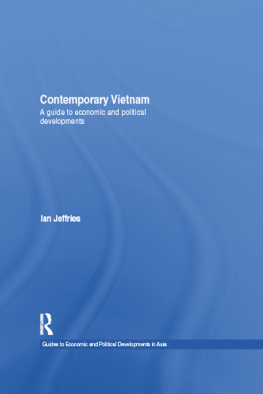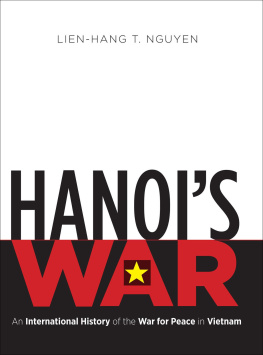Cover

| title | : | Vietnam : Anatomy of a Peace |
| author | : | Kolko, Gabriel. |
| publisher | : | Taylor & Francis Routledge |
| isbn10 | asin | : | 0415159903 |
| print isbn13 | : | 9780415159906 |
| ebook isbn13 | : | 9780203131718 |
| language | : | English |
| subject | Communism--Vietnam, gtt--Economische politiek, gtt--Communisme, gtt--Vrede, Vietnam--History--1975- , Vietnam--Social conditions, Vietnam--Economic conditions--1975- |
| publication date | : | 1997 |
| lcc | : | DS559.912.K65 1997eb |
| ddc | : | 959.704/4 |
| subject | : | Communism--Vietnam, gtt--Economische politiek, gtt--Communisme, gtt--Vrede, Vietnam--History--1975- , Vietnam--Social conditions, Vietnam--Economic conditions--1975- |
Page i
Vietnam: Anatomy of a Peace
Vietnam has experienced profound political and economic changes since the war. In Vietnam: Anatomy of a Peace, Gabriel Kolko looks at the economic program the Communist Party has embarked upon since 1986 and outlines the transition to nascent capitalism. He also explores reforms impact in demoralizing the partys members and the people.
Based on extensive research and first-hand experience, Vietnam is a vivid portrait of Vietnam today and the profound dilemmas it is confronting. Market reforms are producing serious social and economic difficulties in Vietnam; peasants are losing their land, inequality is creating a class society, and the industrial workers are amongst the most exploited in the world. In the light of these problems, Gabriel Kolko outlines how the Communists are failing to cope with the contradictions between daily realities and their original idealistic aims.
Gabriel Kolko argues that Communist efforts to merge a socialist with a market strategy have only optimized the worst aspects of each. The Communists have lost control over developments since 1986. After successfully confronting the United States in war, the Communists are now close to losing the socialist cause for which they fought.
Gabriel Kolko is Distinguished Research Professor Emeritus, York University, Toronto, and author of ten books, including Anatomy of a War.
Page ii
This page intentionally left blank.
Page iii
Vietnam: Anatomy of a Peace
Gabriel Kolko

London and New York
Page iv
First published 1997
by Routledge
11 New Fetter Lane, London EC4P 4EE
This edition published in the Taylor & Francis e-Library, 2007.
To purchase your own copy of this or any of Taylor & Francis or Routledges collection of thousands of eBooks please go to www.eBookstore.tandf.co.uk.
Simultaneously published in the USA and Canada
by Routledge
29 West 35th Street, New York, NY 10001
1997 Gabriel Kolko
All rights reserved. No part of this book may be
reprinted or reproduced or utilized in any form or by
any electronic, mechanical, or other means, now known
or hereafter invented, including photocopying and
recording, or in any information storage or retrieval
system, without permission in writing from the
publishers.
British Library Cataloguing in Publication Data
A catalogue record for this book is available from the
British Library
Library of Congress Cataloguing in Publication Data
A catalogue record for this book has been requested
ISBN 0-203-13171-1 Master e-book ISBN
ISBN 0-203-31938-9 (OEB Format)
ISBN 0-415-15989-x (hbk)
ISBN 0-415-15990-3 (pbk)
Page v
To Joyce, for all the reasons
To all those with whom I worked and shared a common cause, and who made this book both possible and necessaryonce again
To Ho Chi Minh and those Vietnamese who earned and deserved far far better
Page vi
This page intentionally left blank.
Page vii
Contents
Acknowledgements | viii |
Map of Vietnam | x |
Introduction: The legacy of war | |
| The postwar economy and the origins of market socialism | |
| Economic reform in theory and practice: The crisis of success | |
| The Communist partys political crisis | |
| Land and the crisis of rural society | |
| The social and human costs of reform | |
| Who rules, and why? The Communist party on the threshold | |
Conclusion: Winning the war and losing the peace | |
Epilogue: The necessity and risks of resisting injustice | |
Notes | |
Bibliography | |
Index | |
Page viii
Acknowledgements
When I published my history of the Vietnam War, Anatomy of a War, in 1986, I acknowledged the great inspiration and assistance I had received over twenty years from an informal network of antiwar activists throughout the world who selflessly exchanged vast quantities of documents and information. They lived in the Philippines, Japan, Great Britain, France, Sweden, the Netherlands, and North America. This groups tremendous resources and skills were one way its participants could all express their profound political and moral convictions; their knowledge was a weapon against the war. Whatever differences on politics existed among us, all shared a deep commitment to peace. Without them I could not have written my book on the war in the way that I did, and to a crucial degree it was a common effort.
I made it clear then, as I do now, that I alone assume sole responsibility for everything I have written on Vietnam. Absolutely nothing I have said can or should be attributed, even indirectly, to anyone I have known over the past thirty years. This is especially true for the countless Vietnamese I have met since 1967, some of whom became good friends. Indeed, whenever I criticized Vietnams actions to them, not once, without any exceptions whatsoever, did any agree with me; rather they either disagreed with me politely or usually listened patiently and never indicated approval of my opinions. We shared a deep respect for each others convictions and motives, and nothing would satisfy me more than if that relationship were to continue in the future. Indeed, those who showed the greatest kindness to me also disputed my ideas the most
Several of those I thanked in my book on the war have died, and others will unquestionably dislike my account of postwar
Page ix
Vietnam. But new friends joined the informal circle with whom I have continued to collaborate. Their shared commitment to common ideals and to basic human values has been a great inspiration and encouragement to me. These values guided our common action during the war, and it has been a real satisfaction that many of us have continued to maintain them during the peace. I mention no names in this acknowledgement, but these friends all know who they are. It is to them that I renew the dedication I wrote in my book on the war.
Next page








